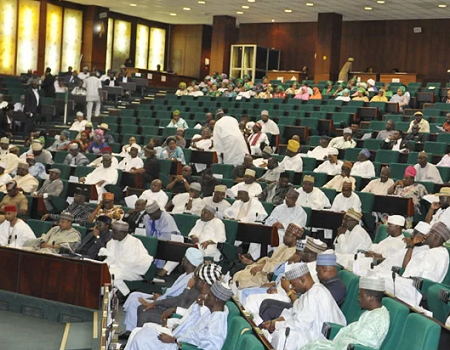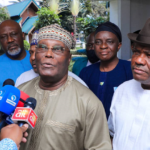THERE are strong indications that the House of Representatives may seek judicial interpretation of the ruling delivered by Federal High Court on the deletion of the controversial Section 84(12) of the Electoral Act signed into law by President Muhammadu Buhari.
Chairman, House Committee on Media and Public Affairs, Honourable Benjamin Kalu, who conveyed the House position on the ruling, denied knowledge of National Assembly being a party in the suit.
While giving insight to the rationale behind the introduction of the new provision, he argued that the provisions of the 1999 Constitution (as amended) was misconstrued, as it clearly stipulates who a public servant is, not political appointees.
Kalu said: “The judgment of the Federal High Court has raised a couple of issues. Let me say that the House of Representatives is not aware of this legal matter and is still not aware whether we were necessary party to this matter or not.
“It is important to note that it is out of place to comment on a judgment for which we are yet to see the certified true copy. So, we will make comment on this judgment once we receive the certified true copy, to know the length and breadth of it.
“We have read from the media that the judgment bothers on Section 84(12) of the Electoral Act amendment bill which Mr President signed into law recently and for which Mr President has communicated the National Assembly, that is, the Senate and the House of Representatives.
“As you are aware, the Senate has treated the (president’s) letter by voting on a motion moved on it while the House of Representatives is still waiting for legal opinion from the legal department currently looking at the issues raised by Mr President in that letter before debating it. That was before we heard of this letter.
“When we get the certified true copy, we will like to know who represented us, who served us and all those technicalities.
“It is important to let Nigerians know the mindset of the legislature, our intention while drafting Section 84(12) bothers on having excellent electoral reform.
ALSO READ FROM NIGERIAN TRIBUNE
“As you know, for Electoral reform to be effective, it has to be transparent, accountable, inclusive as much as possible and competitive. It has to be fair for it to be credible.
“If any of these elements is missing at any point of pre-election processes, election processes and post-election processes, it will affect the whole picture.
“That’s why we wanted to address the conduct of appointed officers who are appointees of political officeholders, who are used as tools during conventions and congresses and being part of the body that determine who becomes a candidate in the general election or who will not be a candidate on the general election.
“It is important that how that process is conducted is considered to enable us to have a credible process that will be above board.
“We wanted to give a level playing field for those who have been in government and are not supposed to use the undue advantage of being in government while running for office, especially in political party administration; so that they will be at par with those who are not occupying any office.
“It has nothing to do with public servants. I say this because I heard that many have argued that it offends the provisions of the constitution with regards to Section 66 and a couple of other provisions that bother on how to be qualified or disqualified for an election, especially the section that talks about 30 days withdrawal before election. That is for public servants.
“We are talking about political appointees. Section 318 defines who a public servant is and that does not include political appointees.
“The ability to distinguish between these two will help us understand what the Electoral Act is trying to do as against what is being roped in as trying to do at the moment and that it is offensive to the constitution.
“When we get that judgment, we will know whether that differentiation was clear or not. We have to get the judgment to know if this was clearly demarcated or not. That will help us understand the position from where the judgment was given and the next step to take.”
Also speaking, a chieftain of the All Progressives Congress (APC) close to some federal lawmakers and their political leaders, disclosed to Nigerian Tribune that the controversial judgement is going on appeal.
The source, who is a lawyer, was also confident the lawmakers would triumph at the Court of Appeal.
The development may further put in jeopardy, the aspiration of some appointed public officers believed to be eyeing elective offices in 2023 election.
“Every passing day is putting their aspirations (appointed officials with political ambitions) in peril because it may be too late for them when the matter is finally laid to rest and I can assure you, the lawmakers have a good case, starting with the court not putting them on notice as a necessary party.
“The Court of Appeal will likely ask all parties to go back to the trial court. By then, it may be too late for those rejoicing now,” the source explained.
When asked if the federal lawmakers would want to dare the executive, the source disclosed that what the lawmakers were saying is that whatever agreement that the president had with their principal officers was not binding on them, because they did not promise the president they would remove the section.
A consultant to the National Assembly, who is also a senior lawyer, had explained the problem with the provision as an error on the part of those who worked on the new Electoral Act.
The source disclosed that what was originally planned was for the provision to read that the appointed officials who fail to resign before the primaries cannot be voted for.
Nigerian Tribune was told that barring them from voting at party conventions and primaries is at variance with their constitutional right to vote, as long as they meet the constitutional voting requirements.
“The addition that they can’t vote was an error which the leadership of the National Assembly had privately admitted to. You can’t stop qualified Nigerians from voting but you can regulate electoral activities and procedures. All they (federal lawmakers) wanted to do was ensuring a level-playing field,” the source explained.
Top operative of the Nigerian Bar Association and chairman NBA’s Section on Public Interest and Development Law (NBA-SPIDEL), Dr Monday Ubani, agreed that there should be window of appeal, though he remained committed to his stance that the provision was illegal.
He also wanted the Attorney-General of the Federation and Minister of Justice, Abubakar Malami, to give allowance for appeal before gazetting the Act without the provision. Ubani also picked holes in the decision of the AGF to comply immediately with the judgment.
He said if it was a new dawn of immediate compliance to court orders, then the AGF should enforce the N12 million judgment he got for illegal detention by the Economic and Financial Crimes Commission (EFCC).
He said, “I would have loved a situation whereby INEC, as the body that will use the Act for election purposes and the National Assembly which made the law, were joined as necessary parties in the suit before the judgment was given, though I have no problem with the judgment.
“The provision is ultra vires the Constitution and I have said it was unconstitutional. Even if we want to say that it aligns with the Constitution, the constitution says those to resign should do so a month to election, while this provision is saying six months. It should align with the constitution, not saying those affected should leave office months before the primaries.
“The AGF must also allow for process of appeal before gazetting the Act without the provision. Court orders should be allowed to go through the process of appeal if the window is available. Even if the Federal Government is the defendant, the judgment can still be appealed by interested parties and members of the public. The process of appeal should be allowed.”






